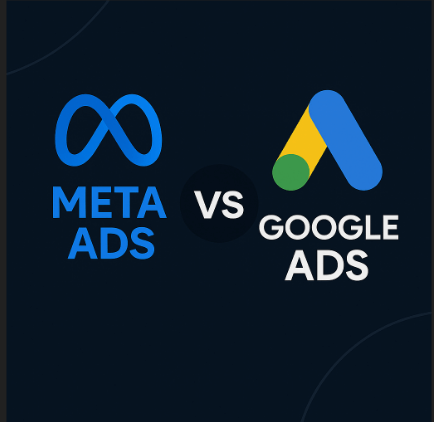If you own a business, chances are you’ve talked about it online: maybe a WhatsApp status update, a quick tweet, a LinkedIn post, or an Instagram reel showcasing what you do. Why? It’s the way to go these days. Social media marketing, or more broadly, digital marketing, is how we connect with the world now, largely because we just can’t seem to put our phones down. We’re constantly scrolling, tapping, and searching, so it only makes sense to show up where people are already looking.
But when all is said and done, when you’re ready to go beyond just sharing on your personal accounts, when you want the world to notice you, who do you turn to? Meta Ads or Google Ads? That’s where the real debate begins, and where this article picks up.
What Are Meta Ads (Facebook, Instagram, WhatsApp) VS Google Ads?
Meta Ads: Your Social Media Stage
Meta Ads are basically paid advertising across Meta’s platforms: Facebook, Instagram, Messenger, and WhatsApp. They allow you to reach people based on their interests, behaviors, and social connections. A catchy carousel on Instagram? Or maybe a boosted post on Facebook, Meta’s ecosystem is all about social media advertising, and as such, Meta Ads are great for Brand awareness, engagement, and community building because they easily blend into content people already love scrolling through.
With advanced targeting options like interests, behaviors, demographics, and lookalike audiences, Meta Ads are powerful for reaching niche audiences and running retargeting campaigns. Think of them as your stage for storytelling and brand personality, and it’s only getting better with the platform aiming to integrate artificial intelligence into their service.
A brand could provide a product image and a budget, and Meta’s AI would generate the ad, including image, video and text, and then determine user targeting on Instagram and Facebook with budget suggestions, the report said. – Reuters, Meta aims to fully automate advertising with AI by 2026, WSJ reports
Pros of Meta Ads
-
Highly targeted audiences: You can narrow down by age, location, interests, and even relationship status.
-
Visually engaging formats: Great for image-heavy content like fashion, beauty, food, or events.
-
Massive reach: Billions of active users across Meta platforms.
-
Cheaper CPC (Cost Per Click) compared to some search-based ads.
Cons of Meta Ads
-
Lower intent: People aren’t necessarily looking to buy; they’re just scrolling, and while your ad might be captivating, many would just try to store it in their minds rather than interrupt their entertainment spree.
-
Ad fatigue: Your audience can tire quickly from seeing the same visuals.
-
Learning curve: Meta Business Suite and Ads Manager can be tricky to navigate for beginners.
Best Use Cases for Meta Ads
-
Brand awareness campaigns
-
eCommerce product launches
-
Event promotions
-
Social-driven services like photography, fashion, or lifestyle coaching
Google Ads: The Search Engine Powerhouse
Google Ads, on the other hand, is all about search intent. It lets you place advertisements in search results (Google Search), YouTube, Google Display Network, Gmail, and even Google Maps, but your ads only appear when people actively search for something you offer. Whether it’s “best running shoes under $50” or “website design services in Uganda,” you’re catching users while they’re actively searching for a solution
Google Ads excels at capturing high-intent leads who are ready to buy, sign up, or learn more. It’s ideal for direct-response marketing, eCommerce, and local businesses targeting users in their area.
Pros of Google Ads
-
High buying intent: Users are often ready to purchase or take action.
-
Diverse ad types: Search ads, video ads, shopping ads, app ads—you name it.
-
Measurable performance: Clean analytics and keyword data.
-
Wide reach: Google dominates search, plain and simple.
Cons of Google Ads
-
Can be expensive: Especially in competitive industries like finance or legal.
-
Requires keyword strategy: Not plug-and-play—you need to know your SEO.
-
Limited creative formats for search-based ads compared to social media.
Best Use Cases for Google Ads
-
Local service businesses (plumbers, tutors, clinics)
-
Software or SaaS companies
-
B2B services
-
Lead generation through landing pages
Key Differences Between Meta and Google Ads
| Feature | Meta Ads | Google Ads |
|---|---|---|
| Audience Intent | Low (discovery-based) | High (search-based) |
| Ad Formats | Visual, interactive | Textual, search-driven |
| Platform Reach | Social networks | Search + YouTube + GDN |
| Best For | Brand building | Direct conversions |
| Average CPC | $0.50–$1.50 | $1–$3 (can go higher) |
When to Choose Which Platform
If your goal is brand awareness, visual storytelling, or reaching new audiences based on lifestyle and interests, Meta Ads might be your best bet. It’s ideal for creative content and emotional branding, that is to say:
- Build brand awareness and engagement
- Share visual content (photos, videos, stories)
- Target specific demographics or interests (e.g., young adults, sports fans, parents)
- Retarget website visitors or leads
- Promote a lifestyle or brand story, not just a product
For example, if you’re selling handcrafted jewelry, sharing behind-the-scenes reels, or launching a new café, Meta Ads can help you tell your story to the right audience on Facebook, Instagram, and WhatsApp.
You might also find 5 Ways to Promote Affiliate Products on Social Media insightful.
If you’re aiming for conversions, website visits, or lead generation, especially when users are actively searching for a solution, Google Ads is the smarter choice. Think of it this way: Meta is for discovery, Google is for intent, that is to say:
- You want immediate, high-intent traffic
- Your audience is actively searching for your products or services
- You run an eCommerce store, a service business, or need lead generation
- You want to capture search intent (e.g., “best accounting software for small business”)
- You have a clear budget and specific conversion goals
For example, if you’re a web designer in Kampala, for instance, and someone searches “affordable website design services in Uganda”, Google Ads places your business in front of them exactly when they’re ready to hire.
But then again, why choose one when you can use both strategically?
For example, you could run a Google Search campaign targeting keywords like “affordable website designer in Kampala,” for instance, while simultaneously running Instagram ads for your portfolio and client testimonials. One captures intent; the other builds trust.
And if you are willing to take this one notch further, here are the Best Online Courses to break into Digital Marketing
Cost Comparisons Between Meta and Google Ads
Talking of money:
-
Meta Ads tend to be cheaper per click at $0.50-$2.00, depending on industry, audience, and competition.
-
Google Ads can cost between $1.00 – $5.00 per click, and it can get pricier in competitive industries like finance, legal services, or tech, sometimes going up to $20+ per click. However, the conversion potential is often higher, as users are actively searching for solutions.
Keep in mind that cost doesn’t equal value. A $1 click that never converts is more expensive than a $5 click that leads to a sale. It’s not just about cost per click, but also return on investment (ROI). If Google Ads brings you clients ready to buy, the higher CPC might be worth it.
Which Advertising Platform is Better Between Meta and Google?
If you’re a small business owner asking, “Which is better: Google Ads or Facebook Ads for small businesses?” Well, it all comes down to your goals, your audience, and your product. In most cases, combining both platforms creates the strongest strategy. Use Google to capture demand, and Meta to create it.
If you want to tell a story, build a community, and create a buzz around your brand, Meta Ads might be your best friend.
If you want to drive leads, capture people searching for solutions, and get conversions fast, Google Ads is likely the better choice. In fact, many businesses combine both! You might use Google Ads to capture high-intent leads, then retarget those visitors with Meta Ads to build trust and drive conversions.
Either way, digital marketing is your new best friend. Just pick your platform and go get noticed. And when you think you have it all covered, come check out The Power of Email Marketing for Affiliate Income





